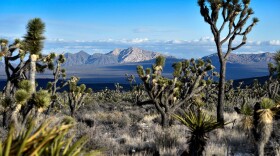Governor Brian Sandoval will be on a bill-signing tour of Las Vegas tomorrow (Thursday, June 15), stopping by the Culinary Health Center to approve SB539 for insulin transparency, and by UNLV to approve three higher education measures. But first, at 9:30 a.m., he’ll be at the Tesla Energy Warehouse near Warm Springs and Rainbow to sign into law three energy bills: AB405, the rooftop solar revival; SB146, for distributed resource planning; and SB150, on energy efficiency.
People keeping track of clean energy bills from the recently concluded legislative session likely noticed a couple omissions from the list above: AB206, the renewable portfolio standards bill; and SB392, for community solar gardens.
“He hasn’t made a decision on those two,” said Sandoval’s spokeswoman, Mari N. St. Martin, about the unmentioned measures.
The suspense has environmental community leaders sitting on the edge of their seats, particularly with respect to AB206, Assemblyman Chris Brooks’ proposal to require 40 percent of the energy that Nevadans consume to come from renewable (geothermal, sun and wind) sources by the year 2030. Unlike other clean energy measures that passed with bipartisan support, the renewable energy standard increase was contentious. The Nevada Resort Association, representing the state’s primary industry, opposed the bill, but MGM Resorts broke ranks to support it, joined by Dignity Health, eBay, Levi Strauss, Switch and Unilever. Advocates on both sides rallied constituents in the fight over the legislation, which ultimately passed by a narrow margin.
Why is it such a big deal?
“AB 206 is a critical piece of legislation this year, because it’s the overarching clean energy legislation we saw in the 2017 session,” the Sierra Club’s Elspeth DiMarzio says. “It’s the most comprehensive of all the bills that we saw get passed. It will provide a framework going forward if we do enter into an energy choice future.”
In her statement on the bill, Nevada Resort Association President Virginia Valentine said, “In our numerous conversations about the bill, (energy) experts have repeatedly advised that they have not seen sufficient information on the effect it may have on rates, reliability, and more broadly, the Western Energy market …”
Explaining his initial hesitation about signing the bill, Sandoval cited the Energy Choice Initiative, a ballot measure that voters approved last fall and that would open Nevada’s electricity market to competitors with NV Energy. He echoed the Resort Association’s belief that it doesn’t make sense to impose energy standards on a utility that will be undergoing a shift in its supply and delivery paradigm. Environmentalists counter that Nevada wouldn’t be the first state to implement a renewable energy standard increase alongside retail choice, and that NV Energy already has under development enough renewable generation stations to cover the increase.
Less controversial is SB392, the solar gardens bill introduced by Senators Moises Denis and Pat Spearman. It would create a process for renters, homeowners, small businesses, nonprofit organizations and churches to band together and install solar arrays on rooftops, over parking lots and on vacant land. It’s meant to expand access to renewable energy into areas where it would otherwise be out of reach for most residents. The bill also includes incentives for low-income participants.
Here’s a recap of the five pieces of clean energy legislation that Desert Companion outlined in May:
- AB405, the rooftop solar bill – Sandoval will sign it into law tomorrow
- AB206, the RPS bill – fate unknown
- SB150, energy efficiency (for utilities) – To be signed tomorrow
- AB223, energy efficiency (for low-income residents) – Signed May 31
- SB392, community solar gardens – fate unknown







